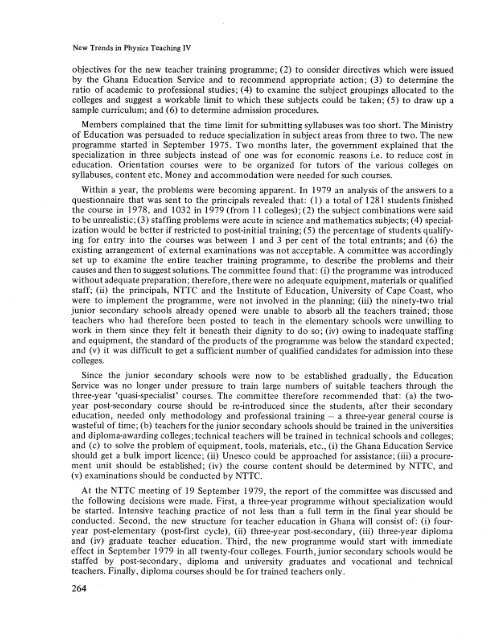New trends in physics teaching, v.4; The ... - unesdoc - Unesco
New trends in physics teaching, v.4; The ... - unesdoc - Unesco
New trends in physics teaching, v.4; The ... - unesdoc - Unesco
You also want an ePaper? Increase the reach of your titles
YUMPU automatically turns print PDFs into web optimized ePapers that Google loves.
<strong>New</strong> Trends <strong>in</strong> Physics Teach<strong>in</strong>g IV<br />
objectives for the new teacher tra<strong>in</strong><strong>in</strong>g programme; (2) to consider directives which were issued<br />
by the Ghana Education Service and to recommend appropriate action; (3) to determ<strong>in</strong>e the<br />
ratio of academic to professional studies; (4) to exam<strong>in</strong>e the subject group<strong>in</strong>gs allocated to the<br />
colleges and suggest a workable limit to which these subjects could be taken; (5) to draw up a<br />
sample curriculum; and (6) to determ<strong>in</strong>e admission procedures.<br />
Members compla<strong>in</strong>ed that the time limit for submitt<strong>in</strong>g syllabuses was too short. <strong>The</strong> M<strong>in</strong>istry<br />
of Education was persuaded to reduce specialization <strong>in</strong> subject areas from three to two. <strong>The</strong> new<br />
programme started <strong>in</strong> September 1975. Two months later, the government expla<strong>in</strong>ed that the<br />
specialization <strong>in</strong> three subjects <strong>in</strong>stead of one was for economic reasons i.e. to reduce cost <strong>in</strong><br />
education. Orientation courses were to be organized for tutors of the various colleges on<br />
syllabuses, content etc. Money and accommodation were needed for such courses.<br />
With<strong>in</strong> a year, the problems were becom<strong>in</strong>g apparent. In 1979 an analysis of the answers to a<br />
questionnaire that was sent to the pr<strong>in</strong>cipals revealed that: (1) a total of 128 I students f<strong>in</strong>ished<br />
the course <strong>in</strong> 1978, and 1032 <strong>in</strong> 1979 (from 11 colleges); (2) the subject comb<strong>in</strong>ations were said<br />
to be unrealistic; (3) staff<strong>in</strong>g problems were acute <strong>in</strong> science and mathematics subjects; (4) specialization<br />
would be better if restricted to post-<strong>in</strong>itial tra<strong>in</strong><strong>in</strong>g; (5) the percentage of students qualify<strong>in</strong>g<br />
for entry <strong>in</strong>to the courses was between 1 and 3 per cent of the total entrants; and (6) the<br />
exist<strong>in</strong>g arrangement of external exam<strong>in</strong>ations was not acceptable. A committee was accord<strong>in</strong>gly<br />
set up to exam<strong>in</strong>e the entire teacher tra<strong>in</strong><strong>in</strong>g programme, to describe the problems and their<br />
causes and then to suggest solutions. <strong>The</strong> committee found that: (i) the programme was <strong>in</strong>troduced<br />
without adequate preparation; therefore, there were no adequate equipment, materials or qualified<br />
staff; (ii) the pr<strong>in</strong>cipals, NTTC and the Institute of Education, University of Cape Coast, who<br />
were to implement the programme, were not <strong>in</strong>volved <strong>in</strong> the plann<strong>in</strong>g; (iii) the n<strong>in</strong>ety-two trial<br />
junior secondary schools already opened were unable to absorb all the teachers tra<strong>in</strong>ed; those<br />
teachers who had therefore been posted to teach <strong>in</strong> the elementary schools were unwill<strong>in</strong>g to<br />
work <strong>in</strong> them s<strong>in</strong>ce they felt it beneath their dignity to do so; (iv) ow<strong>in</strong>g to <strong>in</strong>adequate staff<strong>in</strong>g<br />
and equipment, the standard of the products of the programme was below the standard expected;<br />
and (v) it was difficult to get a sufficient number of qualified candidates for admission <strong>in</strong>to these<br />
colleges.<br />
S<strong>in</strong>ce the junior secondary schools were now to be established gradually, the Education<br />
Service was no longer under pressure to tra<strong>in</strong> large numbers of suitable teachers through the<br />
three-year ‘quasi-specialist’ courses. <strong>The</strong> committee therefore recommended that: (a) the twoyear<br />
post-secondary course should be re-<strong>in</strong>troduced s<strong>in</strong>ce the students, after their secondary<br />
education, needed only methodology and professional tra<strong>in</strong><strong>in</strong>g - a three-year general course is<br />
wasteful of time; (b) teachers for the junior secondary schools should be tra<strong>in</strong>ed <strong>in</strong> the universities<br />
and diploma-award<strong>in</strong>g colleges; technical teachers wil be tra<strong>in</strong>ed <strong>in</strong> technical schools and colleges;<br />
and (c) to solve the problem of equipment, tools, materials, etc., (i) the Ghana Education Service<br />
should get a bulk import licence; (ii) <strong>Unesco</strong> could be approached for assistance; (iii) a procurement<br />
unit should be established; (iv) the course content should be determ<strong>in</strong>ed by NTTC, and<br />
(v) exam<strong>in</strong>ations should be conducted by NTTC.<br />
At the NTTC meet<strong>in</strong>g of 19 September 1979, the report of the committee was discussed and<br />
the follow<strong>in</strong>g decisions were made. First, a three-year programme without specialization would<br />
be started. Intensive teach<strong>in</strong>g practice of not less than a full term <strong>in</strong> the f<strong>in</strong>al year should be<br />
conducted. Second, the new structure for teacher education <strong>in</strong> Ghana wil consist of: (i) fouryear<br />
post-elementary (post-first cycle), (ii) three-year post-secondary, (iii) three-year diploma<br />
and (iv) graduate teacher education. Third, the new programme would start with immediate<br />
effect <strong>in</strong> September I979 <strong>in</strong> all twenty-four colleges. Fourth, junior secondary schools would be<br />
staffed by post-secondary, diploma and university graduates and vocational and technical<br />
teachers. F<strong>in</strong>ally, diploma courses should be for tra<strong>in</strong>ed teachers only.<br />
264
















